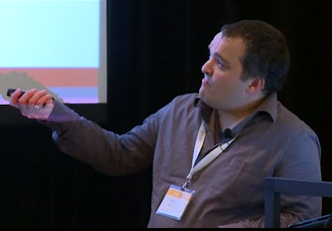The Variant Saga: A happy ending?
Variant is like a union, only it tells you what it currently contains, and it will barf if you try to get something out of it that is does not currently contain. It's the type safe sibling of the union:
variant<double, string> v = 42.; double d = get<double>(v);
I had proposed a variant many moons ago (N4218). After many discussions it seemed that the committee cannot agree on what the ideal C++ variant would look like. I will resolve this cliffhanger -- but before doing that let me introduce you to some of the key discussion points.
An ideal variant will always contain one of its alternative types. But look at this code snippet:
variant<string, MyClass> v = "ABC"; v = MyClass();
The second line will destroy the old value contained in the variant and construct the new value of a different type. Now suppose that the MyClass construction threw: what will the variant contain? What happens when you call get<1>(v)? What happens when the variant gets destroyed?
We either provide the strong exception guarantee (the variant would still contain the string) -- but this requires double buffering, as for instance boost::variant does. Or we could restrict the alternative types to only those that are nothrow_move_constructible. Or we make this a new state -- "invalid, because the variant has been derailed due to an exception thrown during type changing assignment". Or we say "you shouldn't write code that behaves like this; if you do you're on your own", i.e. undefined behavior. The committee was discussing what to do, and so was The Internet. There are other design decisions -- default construction, visitation etc -- but they are all insignificant compared to how to deal with the throwing, type-changing assignment.
I have tried to present the options and their pros and cons in P0086. In short: it's incredibly difficult and fragile to predict whether a type is_nothrow_move_constructible. And double buffering -- required for a strong exception guarantee -- kills the quest for an efficient variant. But efficiency is one of the main motivations for using a discriminated union.
After the second Library Evolution Working Group (LEWG) review in Lenexa, we got P0088R0: a design that was making this invalid state extremely rare. But if it happened, access to the value would result in undefined behavior. This caused a vivid reaction from the committee members. And from The Internet. Hundreds of emails on the committee email lists. Many many smart and convincing blog posts.
In the end, different parts of the committee strongly supported different designs -- and vetoing other designs. Massive disagreement. So when we came to our C++ Standards Meeting in Kona, it was immediately clear that we needed to expose this to the full committee (and not just LEWG). The expectation was that we would declare variant dead, and keep it locked away for the next five years. At least. (An I would have time to water my fishes again.)
So back to the cliffhanger. On the full committee, Monday evening stage in Kona were David Sankel and I. We presented (and represented) the different design options. While we were discussing with the committee members, live and uncut and on stage, David and I realized that we could make it happen. "The Kona Kompromise": similar to P0088R0, but instead of undefined behavior when extracting the value of such a zombie variant it would just throw!
The Kona Kompromise means that we don't pay any efficiency for the extremely rare case of a throwing move. The interface stays nice and clean. A variant of n alternatives is a "mostly" an n-state type. It offers the basic exception guarantee at no relevant performance loss. It is a safe vocabulary type for every-day use, also for novices. The vast majority of the committee was convinced by this idea. Almost everyone in the room was happy!
Do we have a std::variant now? Not yet. But we are a giant leap closer: variant is now under wording review with the Library Working Group (LWG); I will publish a new revision in the Kona post-mailing (P0088R1). This will get re-reviewed in Jacksonville, first week of March. Once LWG gives the green light, the full committee can vote variant into a Technical Specification (TS) as std::experimental::variant. Now that a large fraction of the committee has expressed its consent (happiness, even!), I expect that this will be in the TS called Library Fundamentals, v3. It might or might not make it into C++17 -- that depends mostly on how quickly I manage to bring P0088 into an acceptable state, and how quickly we will gain use experience with variant.
So there is one thing I'd really appreciate your help with: std::experimental::variant will show up in library implementations near you, likely in their first releases next year. It would be fantastic if you could try it out, and as importantly: give feedback, on the public forums or by contacting me directly ([email protected]). Your feedback will tell us whether the design decisions we took are the right ones, for instance regarding default construction, visitation, performance, and especially converting construction and assignment. As they say here: Mahalo!
Axel Naumann, CERN ([email protected])

 You can now compile using Visual C++ without Visual Studio:
You can now compile using Visual C++ without Visual Studio: Have you registered for CppCon 2015 in September? Don’t delay –
Have you registered for CppCon 2015 in September? Don’t delay –  Have you registered for CppCon 2015 in September? Don’t delay –
Have you registered for CppCon 2015 in September? Don’t delay –  Have you registered for CppCon 2015 in September? Don’t delay –
Have you registered for CppCon 2015 in September? Don’t delay –  Have you registered for CppCon 2015 in September? Don’t delay –
Have you registered for CppCon 2015 in September? Don’t delay –